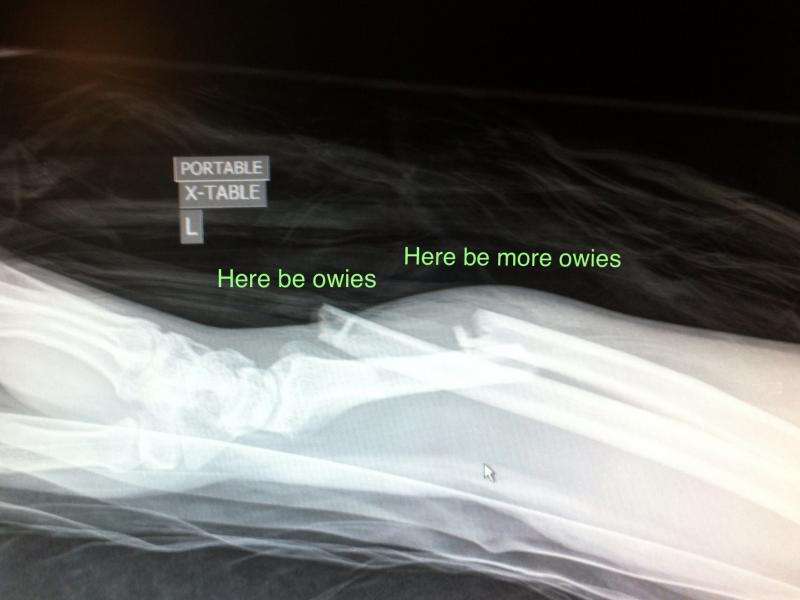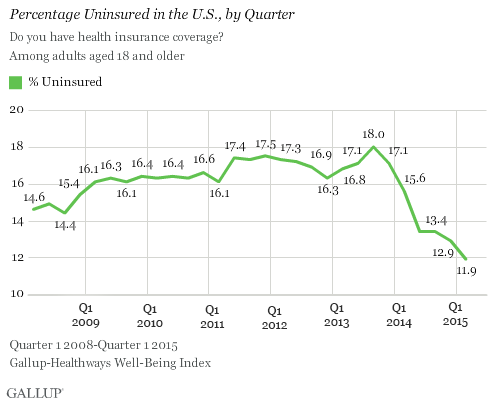Opinion: The impact of Obamacare, one year on
I used to bike to work every day in grad school. I lived around 2km away from the hospital I was based at (~ 1.24 miles), so biking was just the most efficient way to get to work every morning. One sunny July morning though, it all came crashing down. I was biking in, following the same route I'd taken literally hundreds of time before. And a pedestrian (with headphones in, oblivious to the world) walked out in front of me. I swerved to avoid them, hit the curb and then flew off my bike.
I don't remember the next 15 seconds or so. I remember avoiding the pedestrian, losing control, and then the next thing I remember is being flat on my back. I then sat up and remember thinking that my left arm felt funny. I reached over and pulled it onto my lap, and then realized I was in trouble. The fact it was bent in ways it should never be bent in was one indication, the other was the shard of bone sticking out. A bystander yelled "Hey! Are you okay?" to which I replied "CALL AN AMBULANCE! MY INSIDES ARE OUTSIDE!!" (I'm quite proud of broken me for saying that).

So I'm lying there, covered in blood, bits of gravel and bike, with random strangers helping me out until the paramedics show up. The paramedics arrived quickly, and after bandaging my arm, took me to the emergency. There, doctors and nurses attended to me – taking several x rays, giving me pain medications, and reset my arm (not as easy as resetting a computer). That night I went in for orthopaedic surgery, and had two plates, along with several screws inserted to hold the whole thing back together. Throughout the whole process they made sure I was okay, and made sure I knew what was going on. Following surgery, I spent three days in recovery getting IV antibiotics and medications to ensure the healing went well, before being discharged and being sent on my way.
About a month after my accident I received my bill. I had received round-the-clock medical attention, a host of medications and procedures, as well as amazing care from doctors, nurses, and patient care assistants. The entire bill for my stay came to $45 – the ambulance trip. The rest was completely covered by our public healthcare system.
My accident has been on my mind a lot recently, especially with the US election buzz. While Republican candidates were talking about repealing the Affordable Care Act as recently as February and June of this year, only one candidate actually brought up repealing the ACA in the Republican debate last week, prompting Vox to call Obamacare the biggest winner at that debate. Since now millions of Americans receive health insurance as a result, fighting to repeal that would be disaster for any serious candidate.
That's not to say Obamacare isn't without it's flaws – it's definitely a work in progress that will require refinement and modification as problems and errors emerge. These include the absolutely disastrous rollout, backlogs in applications, as well as unintended consequences of the wording of the ACA. Since employers only need to provide health insurance for those working more than 30 hours a week, many changed their hours to give employees 29.5 hours a week, thus adhering to the letter of the law, but not it's spirit. However, this is to be expected when rolling out a program as large and as ambitious as the ACA. It's how these problems are dealt with that is the key indicator of success.

Recent data from Gallup shows a stark decrease in the number of uninsured Americans from 2014 (the start of the ACA) to 2015. There are other factors at play here as well (falling unemployment being one), but the levels are lower than 2008 pre-financial levels, which suggests this is more than just an improving economy. What this graph doesn't show, however, is which groups this benefits the most. While the average number of uninsured individuals dropped 5.2% for all Americans from 2013 to 2015, this number was higher among those aged 18-25 (-6.7%) and 26-34 year old Americans (-7.4%). It was also highest among those earning less than $36,000 a year (-8.7%), as well as among Hispanic and Black Americans (-8.3% and -7.3% respectively).
The benefits of higher coverage are still being studied. A survey of physicians showed that "59 percent said that their ability to provide high-quality care to their patients has stayed about the same, while 20 percent said it has improved, and 20 percent said it has gotten worse." In addition, many said the expansion has more positive effects than negative ones.
However, these differed significantly on party lines. Physicians who identify as Democrats were almost three times more likely to say the ACA has had a positive effect than Republican physicians, who were almost seven times more likely to say that the ACA has had a negative impact on their practice. This divisiveness could be a result of confirmation bias, or possibly due to these physicians being clustered within different states that have different levels of implementation of the ACA. This will have to be revisited in the future to determine how these attitudes change, and to look at the impact of the ACA on care received by patients. The benefits aren't just for patients either; recent earning reports from Universal Health Services found a decrease in the number of unpaid services rendered (i.e., those without insurance):
The provision for doubtful accounts at our acute care hospitals amounted to approximately $149 million during each of the three-month periods ended June 30, 2015 and 2014, and $274 million and $331 million during the six-month periods ended June 30, 2015 and 2014, respectively. During the three and six-month periods ended June 30, 2015, as compared to the comparable periods of 2014, our acute care hospitals experienced a decrease in the aggregate of charity care, uninsured discounts and provision for doubtful accounts as a percentage of gross charges (emphasis mine).
I can't imagine how stressful it would be to be in the hospital dealing with a serious health concern, and imagining how you were going to be able to afford treatment (and mine wasn't that bad in the grand scheme of things). Despite a dropping number of uninsured Americans, the US still has approximately 36 million people without insurance. With further improvements to the ACA, and as it continues to gather steam and build momentum, hopefully everyone can have access to affordable healthcare.
This story is republished courtesy of PLOS Blogs: blogs.plos.org.















